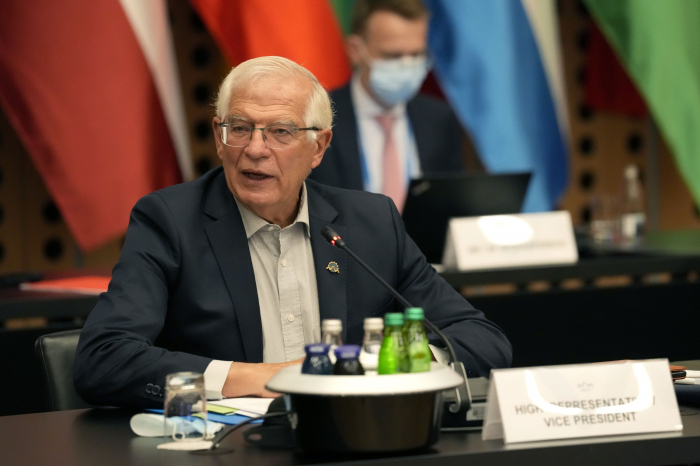EU countries agreed to reestablish a joint presence in Kabul, if security conditions allow, to deal with the Taliban on ensuring safe departures, the bloc's top diplomat said Friday.
"We have decided to work in a coordinated manner to coordinate our contact with the Taliban – including through a joint European Union presence in Kabul ... if the security conditions are met," EU foreign policy chief Josep Borrell said Friday after a meeting of EU foreign ministers in Slovenia, according to remarks carried by The Associated Press (AP).
"In order to support the Afghan population, we will have to engage with the new government in Afghanistan, which doesn't mean recognition. It's an operational engagement," he told a news conference. He said this engagement would increase depending on the behavior of the government, such as Afghanistan not serving as "a base for the export of terrorism to other countries," respecting the rights of women and the media, the establishment of an "inclusive and representative" government, and allowing access for aid. Borrell said the Taliban must live up to its commitment to allow at-risk foreign nationals and Afghans to continue to leave.
"These conditions are not negotiable for us," German Foreign Minister Heiko Maas told journalists. "Of course nobody has the illusion that all of this will be fulfilled 100% in the coming few days," he said, calling it a "long-term task."
Security guarantees
The bloc fears the absence of diplomats leaves the field open to countries such as Russia, China, Iran, Pakistan and Qatar, which are keeping their embassies open.
Maas insisted EU countries would need "security guarantees" before the return of diplomats.
"If we want to help the Afghans we need people in the country who can get this aid to the people in need," he said.
On humanitarian aid, Borrell said the EU would look to step up its help for the Afghan people but would judge the authorities "according to the access they provide."
That comes as the United Nations said it had restarted humanitarian flights to parts of the country, linking the Pakistani capital Islamabad with Mazar-i-Sharif in northern Afghanistan and Kandahar in the south.
The EU is also looking to bolster coordination with Afghanistan's neighbors as it looks to stave off a large-scale flow of migrants from the country to Europe. Borrell said the bloc would look to set up a "regional political platform" with the countries around Afghanistan to help stabilize the situation.
"This political platform will consider, among other issues, the management of population flows from Afghanistan, the prevention of the spread of terrorism, the fight against organized crime, including drug trafficking and human smuggling," he said.
U.K. will not recognize Taliban
On Friday Britain said it will not recognize the Taliban as the new government in Kabul but must deal with new realities in Afghanistan and does not want to see its social and economic fabric broken. Speaking during a visit to Pakistan, Foreign Secretary Dominic Raab said it would not have been possible to evacuate about 15,000 people from Kabul without cooperation with the Taliban, who seized the capital on Aug. 15.
"The approach we're taking is that we don't recognize the Taliban as a government," he said, adding that Britain normally recognized states rather than governments. "We do see the importance of being able to engage and having a direct line of communication."
Raab's comments reflect the balance countries such as Britain and the United States are seeking to strike in the aftermath of the Taliban's lightning victory and the collapse of the Western-backed government in Kabul. Western countries fear that a looming humanitarian crisis in Afghanistan and an economic collapse could create hundreds of thousands of refugees. But they are wary of Taliban promises that Afghanistan will not go back to the harsh fundamentalist rule exercised during their last period in power before 2001.
"The Taliban has made a series of undertakings – some of them are positive at the level of words. We need to test them and see if this translates into deeds," Raab added, as Reuters reported. "It is important at this stage to set or to judge the Taliban by these early, initial and probably, quite modest, tests and see whether they deliver."
He said Britain had released the first tranche of a 30 million pound ($41.5 million) package of humanitarian assistance for Afghanistan's neighbors, which may have to bear the brunt of any large exodus. Raab added that the aid budget for Afghanistan had been increased to 286 million pounds, but future payments would go through aid groups.
Meanwhile, Russian President Vladimir Putin said Friday he hopes the Taliban will behave in a "civilized" manner in Afghanistan so the global community can maintain diplomatic ties with Kabul.
"Russia is not interested in the disintegration of Afghanistan. If this happens, then there will be no one to talk to," Putin said while speaking at the plenary session of the Eastern Economic Forum in Russia's far eastern city of Vladivostok.
"The sooner the Taliban will enter the family of civilized people, so to speak, the easier it will be to contact, communicate, and somehow influence and ask questions," he added. The longtime Russian leader said the withdrawal of U.S.-led forces from Afghanistan completed last month had ended in "catastrophe."
"They spent $1.5 trillion on this whole campaign and what is the result? There isn't any," Putin said.
Russia has tread carefully in its dealings with the militant group that swept to power in Afghanistan this summer. Russia's ambassador in Kabul met with representatives of the Taliban several days after the takeover and said Moscow will maintain its embassy in the country.
Last week, Russia started evacuating its citizens and those of several ex-Soviet states as the security situation in the country worsened. Russia has warned about extremist groups using the political turmoil to enter neighboring countries as refugees. Afghanistan shares a border with three ex-Soviet states in Central Asia where Russia holds military bases.
More about:
















































